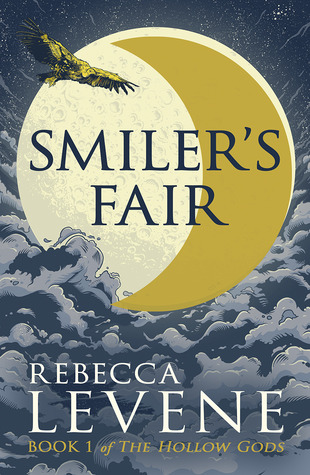I got 51% through Smiler's Fair before giving up.
Smiler's Fair has a beautiful cover, and I've walked past this book several times, each time reading the blurbs on the back, each time putting it back down, not quite convinced, before ultimately giving in to the lure of the cover and buying it after all.
The book is not badly written. But sadly, it was, for me, entirely devoid of enjoyment and a slog to progress through. With a cast of dozens, many viewpoint characters, various cultures and a world spanning from icy north to deserts, full of gritty violence and a dollop of sex, it's quickly obvious that this is a Song of Ice and Fire copycat effort. But for reasons I could not immediately identify, it left me cold and disinterested. I slogged through chapter after chapter, wondering why this book fell so flat, when it seemed to emulate the ingredients of Song of Ice and Fire fairly accurately - with short, punchier chapters to boot.
It's full of characters who are not terribly likeable. But so is George R R Martin's world. Its violence is tainted with a slight twinge of sleaze. But so is George RR Martin's world. There's monsters in the dark. But so... you get the idea.
There was one obvious gripe, but on its own, that wasn't enough to make me discard the book. Early on, a character is surprised and disbelieving that Smiler's Fair (a travelling city of vice & trade) is built on superstitions - that there are worm men / monsters below ground, who come out if the ground is cast in shadow for too long. But very very quickly, that turns out to be true: someone enters a cave, some miners mine... and abracadabra, we have slaughter. The point is: how would any character doubt the superstition if there is everyday evidence of its veracity? (After all, metal is in short supply because mining is so dangerous and that's why everyone who can't afford iron uses flint!) And why on earth would a character originating on a floating "shipborn" fortress that's perpetually moving in circles around a lake (pulled by mammoths on the shore) question another city's perpetual movement and laugh at its 'superstition'? This isn't a case of monsters beyond a wall in far distant lands that no one has seen in generations. This is a case of monsters being an everyday threat. Basically, the book's internal logic is broken, and its own worldbuilding undermined.
But that is not the reason it is so hard to get engrossed in it. After some lengthy thinking, I figure it's a combination of factors. Yes, it's derivative - but there are some excellent GRRM derivative novels out there. Yes, its logic is inconsistent, but that is just a blooper, really. Chapters are short - too short to get absorbed as deeply as George R R Martin's chapters achieve - but not so short that they lack stickiness at all.
No, the reason this book falls so flat is that none of the characters are loved / capable of love. Song of Ice and Fire is built on grit and sleaze and medieval authenticity - but its narrative roots in the reader's psyche are created by bonds and love: The Starks are a loving family with strong bonds. (Okay, there's John Snow's position in the family, but I'm not saying the family is without its problems - I'm saying it is largely built on trust and love). Tyrion Lanister is a fascinating hero because he is the only Lanister who feels genuine love for some characters. Daenerys loves - even if her marriage is arranged, she never gets over Kal Drogo. In Smiler's Fair, there is scheming and violence and sleaze and humiliation and politicking and sadism and prophecy (by the way, I wish fantasy writers would give up the prophecy shtick: it was great in Dune, but that was 50 years ago) and religion - but so far, only one relationships which appears to be briefly loving (I was elated for all of three sentences, then it all went kaputt in the next chapter).
And if no one in this world loves or is loved, if there are no strong bonds between characters, then how can the reader really grow fond of any of them? Song of Ice and Fire may be full of dysfunctional, twisted characters and events, but it keeps the reader hooked by throwing decent human beings who have strong, positive emotions and some internal moral compass into the mix. Smiler's Fair mimics the twistedness but falls short on the kernels of goodness.
So, 51% into the book, I gave up. I was just not enjoying it. Derivative, I can deal with. Lacking any soul at all: not so much.
Rating: 2/5 (estimated, based on reading 51% and giving up)

2 comments:
Now you know where that adage about book covers came from.
Yup.
In fairness, every other review I can find sings this book's praises and awards it 5 stars, so it's always possible that I'm very much in the minority for not enjoying it at all.
Post a Comment